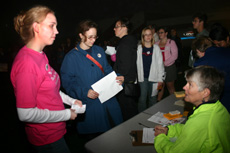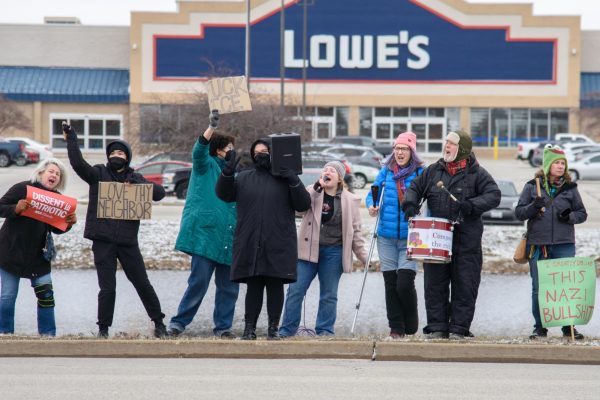Community rallies for contraception
Oct 29, 2004
Last updated on May 11, 2016 at 04:44 p.m.
Students and community members held signs that read, “Back Up Your Birth Control,” and “Women’s Health Matters” during a rally for emergency contraception on the southeast corner of Green and Neil streets Thursday evening.
Brooke Anderson, community organizer for Champaign County Health Care Consumers, one of the 36 organizations that co-sponsored the event, said the rally is part of a national movement to pass legislation to make it easier for women to have access to emergency contraception.
“Ultimately, we want to see the Food and Drug Administration approve emergency contraception, specifically, the main brand called Plan B,” she said. “We think that women in Illinois can’t wait for the Food and Drug Administration to do this. We want to see women have access without prescription to emergency contraception as soon as possible.”
Emergency contraception, also known as the morning-after pill, works to prevent pregnancy by inhibiting ovulation, fertilization or implantation of an egg in the uterus, according to information provided by McKinley Health Center.
Get The Daily Illini in your inbox!
Currently, a woman must have a prescription from a doctor before she can receive emergency contraception.
Kim Rice, sexual health educator at McKinley, said emergency contraception is most effective when taken within five days of unprotected sex. She also said University students can get emergency contraception from McKinley for free, but they still need the prescription from a physician.
Rachel White-Domain, sophomore at Parkland College, spoke during the rally. She said women might have difficulty getting their prescription filled because not all pharmacies stock the drug.
“It’s incredibly frustrating, like getting knocked down right at the goal line,” she said.
During the rally, demonstrators announced the results of a survey that showed which local pharmacies had emergency contraception in stock. Out of 21 pharmacies in the area, eight have the emergency contraception.
Dr. Anne Robin from Planned Parenthood wrote prescriptions for emergency contraception – free of cost – during the rally. After the event, a group of women walked to the nearby Osco Drug to fill the prescription after the rally.
“As a physician, I think this is a very safe and effective form of contraception,” Robin said.
Although the RU-486 abortion pill and emergency contraception are both referred to as the “morning-after pill,” Anderson stressed that the two were not the same. She said taking the emergency contraception pill only prevents fertilization, and if a person is already pregnant, the medication will not harm or terminate the pregnancy. She also said the pill is not a substitute for other forms of birth control.
“It’s your Plan B, not Plan A,” she said.
She said easier access to the contraception is important because if a woman is sexually assaulted or her contraception fails on a Friday night, she will have difficulty seeing a doctor over the weekend. This might diminish her chances of getting emergency contraception in time for it to be effective, Anderson said.
David Rowland, a University graduate student, said the country has a responsibility to provide easy access to emergency contraception.
“The truth is, even when people are being responsible, accidents happen and a responsible culture finds ways to help people be responsible, even when accidents happen,” he said.
Shirley Stillinger, member of the American Civil Liberties Union, which also co-sponsored the rally, said she has fought for reproductive freedom for many years.
“It’s a constant struggle,” she said. “If we don’t keep supporting (reproductive rights), we may lose what we have.”
Two years ago, Champaign County Health Care Consumers supported legislation to require health insurance plans to cover contraceptives, Anderson said.
For her, the rally was just the beginning.
“This is definitely part of a larger movement for affordable women’s health care,” she said. “All women should have the ability to determine when and if they become pregnant. Their health and economic status sometimes depend on that ability.”






